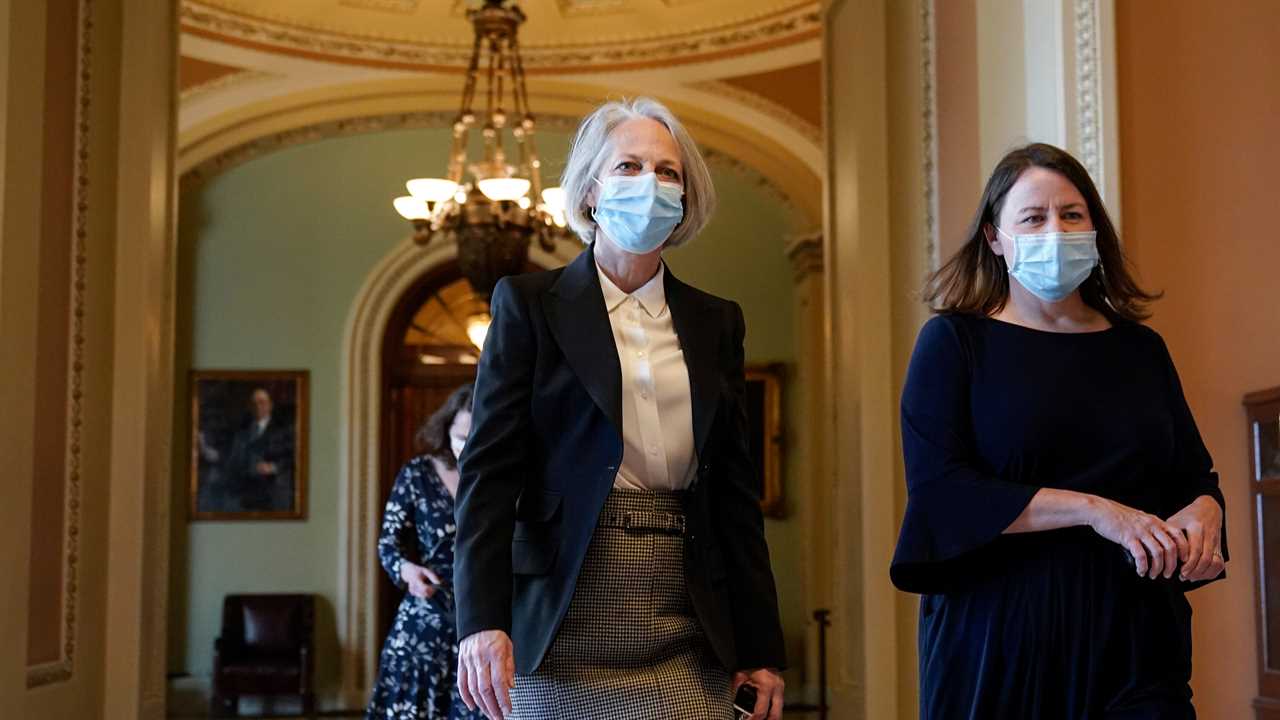
WASHINGTON — As Lt. Gen. Karen Gibson watched the violence and horror of the Jan. 6 mob attack on the Capitol, her mind flashed back to the war zones where she had led military intelligence operations.
“I was aghast,” General Gibson recalled on Monday, standing on a balcony on the west side of the Capitol, not far from where rioters had smashed widows and assaulted police officers.
“I thought, ‘I am witnessing the kind of activities that I have seen happen in nations I deployed to.’ I never expected to see that in the United States. It was shocking.”
Now it is up to General Gibson, 56, of Bozeman, Mont., to try to ensure that such an assault never reaches the halls of Congress again.
On Monday, she was sworn in as the Senate’s new sergeant-at-arms, its top security official. She is just the second woman to hold the position in the chamber’s 232-year history. General Gibson’s leadership team is groundbreaking: It includes Kelly Fado as deputy sergeant-at-arms and Jennifer Hemingway as chief of staff — the first time all three of the Senate’s top security posts have been held by women.
“People have been selected for their qualifications and their competence,” General Gibson, who retired from the Army last year, said in an interview. “Gender is perhaps not really relevant.”
Senator Chuck Schumer, Democrat of New York and the majority leader, called the team the “three most qualified people you could find.”
“Maybe in the past someone would say, ‘We can’t have three women,’” he said. “No more.”
General Gibson is taking over the job at a demanding time for Capitol security. Nearly 140 police officers were injured during the pro-Trump attack that left five people dead. In the aftermath, all three top Capitol security officials resigned under pressure.
They have since blamed intelligence and communication breakdowns for their failure to prevent hundreds of Trump supporters from overrunning hundreds of police officers and storming the building, seeking to block the peaceful transfer of power from one administration to the next. A bipartisan majority of senators voted to convict former President Donald J. Trump on an impeachment charge of inciting the mob, but fell short of the two-thirds needed for conviction.
“We all have bad memories of what happened here,” Mr. Schumer told General Gibson on Monday. “I am confident with your leadership that will never happen again.”
During her 33-year military career, General Gibson rose to be a deputy director of national intelligence. She worked on operations in Iraq, Afghanistan, East Africa, Korea and the Pacific, and across the Middle East. As the director of intelligence for U.S. Central Command, she was involved with clandestine ground operatives and technical intelligence collection from space.
After the attack, General Gibson volunteered to join a Capitol security review led by Lt. Gen. Russel L. Honoré, a retired Army officer who had been appointed by Speaker Nancy Pelosi. That task force recommended hiring more than 800 Capitol Police officers, building mobile fencing around the complex and changing Capitol Police Board procedures to allow the chief of the agency to quickly summon the National Guard during an emergency.
As part of the task force, General Gibson studied the ins and outs of the use of intelligence by security personnel and found some major deficiencies, including that “only a handful of people in the U.S.C.P. have significant intelligence training,” according to the report, which used the acronym for the Capitol Police.
Mr. Schumer said one of the reasons security officials were caught unaware by the mob was “just a pure intelligence failure.”
“There was intelligence there,” he said. “We have one of the great experts in America on intelligence right now serving as the sergeant-at-arms.”
General Gibson must also strike the delicate balance between securing the Capitol and maintaining public access to a symbol of American democracy. Within weeks of the attack, lawmakers in both parties and residents began to chafe at the presence of thousands of National Guard troops and high fences fortifying the Capitol.
“Already, the U.S. Capitol Police is beginning to make some of those trade-offs with parts of the fence coming down,” she said. “Any legislative body, more so than some elements in the executive branch, needs to balance that kind of public access with security.”
She said she hoped to restore the “faith” and “confidence” in the office.
General Gibson’s leadership team includes people who have worked for both parties in the Capitol.
Ms. Fado, her No. 2, has spent more than 25 years in the Senate, including as the director of operations for Tom Daschle, the former Democratic leader, and the Democratic liaison to the sergeant-at-arms when Mr. Schumer became the leader.
Ms. Hemingway, the chief of staff, was the acting sergeant-at-arms under Senator Mitch McConnell, Republican of Kentucky and the minority leader. She previously served as the director of House operations for former Speaker Paul D. Ryan.
After Jan. 6, congressional leaders demanded the resignations of top security officials whom they faulted for failing to protect the building from the mob.
“I was so disappointed in how the previous sergeant-at-arms had handled this situation,” Mr. Schumer said on Monday. “I said we just have to get the highest-quality person. We never want to repeat that experience.”






